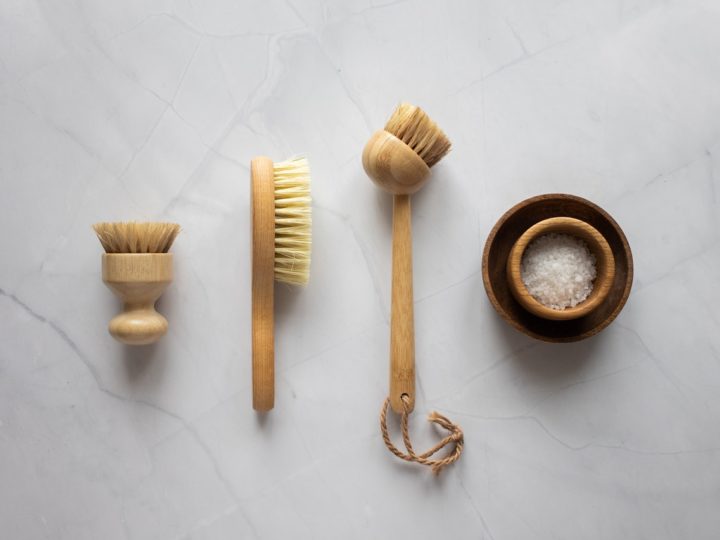7 HERBAL FACE SCRUBS
For Better Skin

Yeah, beauty is pain, but it’s not supposed to feel like rubbing sandpaper on your face. If you tried that new skin scrub expecting a rejuvenating facial but ended up with raw, red, and worse looking skin than what you started with, we feel your pain. With the hundreds of exfoliating options out there, though, how are we supposed to know which ones are actually going to fix our skin?
Modern exfoliating options have leapt into the market – many of which have ditched those rough beads and opt for more natural methods. Our skin cells are constantly being replaced and repaired by our bodies. As kids, this process happens quite rapidly, but as we age it slows down, just like our metabolism (insert sad face here). This results in a buildup of dead skin cells that can leave skin with clogged pores, breakouts, and looking dull. When we exfoliate, we make up the difference for that internal slowdown and keep our skin looking beautiful.
While removing those dead skin cells is needed for new growth, exfoliating the wrong way can actually be way worse for you than not exfoliating at all. So, review the herb options and tips for exfoliating and get on your way to healthier skin…
7 Medicinal Herbs for Better Skin
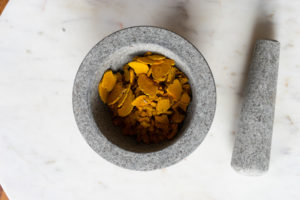 When it comes to natural ways to get better skin, TCM has you covered. Herbs can be used to soothe existing skin trouble or just for regular maintenance. While a TCM practitioner or licensed herbalist can provide an in-depth consultation and prescribed herbal mix or products, these are a few common herbs used to promote healthy skin.
When it comes to natural ways to get better skin, TCM has you covered. Herbs can be used to soothe existing skin trouble or just for regular maintenance. While a TCM practitioner or licensed herbalist can provide an in-depth consultation and prescribed herbal mix or products, these are a few common herbs used to promote healthy skin.
So here’s a breakdown of what you need to know about these herbs. Chamomile tea and tea tree oils are by far the most popular solutions for those deep in the trenches fighting the acne battle. Many people use tea tree oil or diluted forms as a topical oil after cleansing. Chamomile tea leaves can be used to make your own exfoliating scrubs or compresses at home. If you’re dealing with rosacea, honeysuckle is a great option, while calendula oil is a good choice for soothing eczema.
If you’re just looking to maintain general skin wellness, turmeric is a powerful anti-inflammatory agent while reishi is an antioxidant built to protect from pollution. Oregano is said to support your skin’s microbial balance. All of these herbs are good additions to sugar scrubs, or oils that you can make at home. It’s also a good idea to look for these herbal ingredients in store-bought exfoliating products.
Exfoliating 101
Before we dive into the natural ways of balancing out your skin, let’s cover the basics of exfoliating. The beauty and skincare markets are so flooded with products that it can be impossible to know which will actually give you that glowing look sans IG filter.
What Kind of Exfoliators Are Out There?
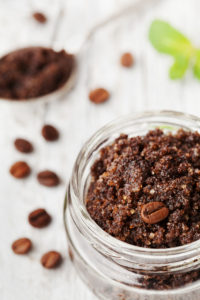 There are two types of exfoliators; physical and chemical. Physical exfoliators are the ones you’re likely most familiar with. These require physical scrubbing and manipulation to remove the dead skin cells. Chemical exfoliators don’t require scrubbing, and can simply set on the skin, breaking down the dead cells using their chemical compounds. Within those two types there are further specifications regarding ingredients, chemicals, consistency of the product, scents, and more.
There are two types of exfoliators; physical and chemical. Physical exfoliators are the ones you’re likely most familiar with. These require physical scrubbing and manipulation to remove the dead skin cells. Chemical exfoliators don’t require scrubbing, and can simply set on the skin, breaking down the dead cells using their chemical compounds. Within those two types there are further specifications regarding ingredients, chemicals, consistency of the product, scents, and more.
Know Your Skin Type
While your skin might be dry as the Sahara Desert, your best friend’s skin could be more oily than potato chips. Just like your other products, you should pick your exfoliator based on your unique skin type. Dry, combination, and oily skin all require different things to stay healthy and happy. If you’re using a chemical exfoliator for your face, there are two types available; alpha hydroxy acid (AHA) and beta hydroxy acid (BHA). If you typically have normal, dry, or sensitive skin, you’ll want to opt for an AHA product. People with oily skin or consistent acne should find a BHA product.
One Kind Doesn’t Fit All
Think about the last time you used an exfoliator on your face. It probably had scratchy beads and might have left your face pink with a slight burning sensation. That’s because the skin on your face is much thinner and more sensitive than other parts of the body like your legs or back. Most of the store-bought exfoliators that claim to be right for your face are actually way too rough for the delicate skin. These exfoliators might work great for those thicker regions of skin, but you’ll stick to less abrasive options for your face.
Test It First
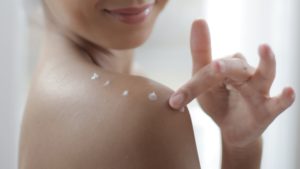 We know that every product says to test it before slathering it all over yourself, but we really mean it this time. You definitely want to test your exfoliator on a small area of your skin first. Even the most natural products can cause your skin to react badly. It’s much better to deal with a reaction on your hand than having to use copious amounts of benadryl and concealer all over your face for a week! Wait 24 hours after testing to make sure you’re in the clear and then treat your skin to some serious exfoliation.
We know that every product says to test it before slathering it all over yourself, but we really mean it this time. You definitely want to test your exfoliator on a small area of your skin first. Even the most natural products can cause your skin to react badly. It’s much better to deal with a reaction on your hand than having to use copious amounts of benadryl and concealer all over your face for a week! Wait 24 hours after testing to make sure you’re in the clear and then treat your skin to some serious exfoliation.
Scrub With Care
Before you dive right it, recognize that your skin might not be well suited to scrubbing. If you have extremely dry skin, or painful breakouts, scrubbing your skin with a brush or even a loofah can cause irritation, cracking, redness, or burning. If that sounds like you, it’s probably best to apply your exfoliator gently by hand and let it rest on the surface of your skin for 3-10 minutes before rinsing off. You’re also going to want to scrub far less frequently. Some people thrive when scrubbing their skin three times per week, while others are much better off sticking to once each week. Get to know what makes your skin happiest and go from there.
Heal From Within
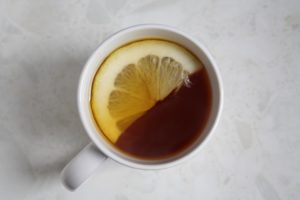
Meghan Markle may have ditched tea time with the Queen, but that doesn’t mean you should! If you want to really give your topical skincare regime a boost, try adding tea to your daily ritual. Tea is one of the most popular ways to reap the benefits of medicinal herbs, and as listed above, there are tons of herbs that can help keep your skin healthy. A few of these teas for skin include green tea, echinacea, olive leaf, and tulsi.
Don’t Rush the Process
Unlike the rest of your day, exfoliation shouldn’t be rushed. Instead of soaking into your skin, they work to get all the junk off of your skin. That process takes a bit more time than you might be used to! Plan to let your chemical exfoliator work its magic for about 10 minutes before moving on to the rest of your skincare process. Even if you’re just physically exfoliating your skin, you should also let the product sink in your skin for a few minutes before rinsing clean.
TCM Explanations for Common Skin Issues
Ever heard that saying, “everything in moderation, nothing in excess”? That’s the essence of TCM, where 6 key excesses are used to classify what’s causing an imbalance. These imbalances can be caused by everything from the weather outside to what we eat and our daily habits.
The 6 Excesses include; heat, summer heat, cold, damp, dryness, and wind. If you find you’re suffering from red, dry, or hot skin you might be experiencing an excess of heat in your body. Heat or fire can develop from one too many cocktails, that social smoking habit you may have picked up, or snacking on too much junk food. An excess of damp might be caused from digestive issues or eating too many rich and fatty foods. Cold might be the root of your skin woes if you have many pimples, cysts, or warts.
Dryness is one of the excesses that causes a ton of skin damage, unsurprisingly through making the skin dry or cracked. The excess of wind tends to cause skin problems that affect many areas of the body such as rashes, itching, or allergic reactions. Each of these can play a part in skin issues, or combine together to magnify them even further. Those dealing with eczema or psoriasis likely suffer from a damp-heat combination, while a wind-heat influence can leave you with red and itchy rashes that move around the body like hives.
If you find you’re facing chronic skin conditions or have questions about your skin, talk with your TCM practitioner and dermatologist. They can craft a holistic plan specific to your needs.
Comments (0)
Leave a reply
You must be logged in to post a comment.



